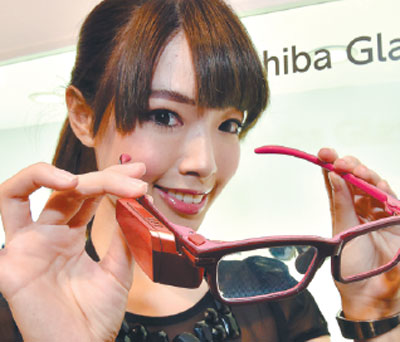Health T-shirts, mind-reading bar unveiled in Japan
Asia's largest electronics fair offers look at innovative cutting-edge gadgets
Glasses that tell you how to get home, advertisements that know where you are looking, and a T-shirt that knows how fast your heart is beating were on display at a huge tech gathering in Japan on Tuesday.
The gadgets were all part of this year's Cutting-Edge IT & Electronics Comprehensive Exhibition, known as the CEATEC, Asia's largest electronics fair, just outside Tokyo.
Nearly 550 companies are taking part in the trade show, which has gathered foreign exhibitors from 24 countries and territories. The show runs through Saturday.
Leading the pack of innovative gadgets is a tiny projection device that can be attached to a pair of glasses to give the wearer an ever-visible screen.
The prototype - dubbed Toshiba Glass and weighing 42 grams - might offer directions or a simultaneous translation, or could assist factory workers who need both hands free while working, a Toshiba researcher said.
"We still don't know what wearable formats will be the most accepted in the future," said Toshiba senior research scientist Yoshiyuki Kokojima.
"Constantly seeing a small screen may get tiring to the eyes, but you could get information without even lifting a finger. It's less effort than consulting a wristwatch."
Meanwhile, leading mobile carrier NTT Docomo was showcasing a T-shirt that uses a special textile to keep track of the wearer's pulse.
The data is transmitted to a smartphone, which must run a specific app, the company said.
While Docomo's offering might have concentrated on health, Fujitsu unveiled something to encourage a bit more relaxation, in the form of a device that could help a barman read his customers' minds.
Small sensors in a bar track where a drinker is looking and automatically offer information on screens about that bottle of expensive wine he keeps gazing at - such as where it comes from and what year it is.
"This could be one way of marketing in the future," said Fujitsu spokesman Naoki Mishiro.
NTT Docomo's Yubi Navi might prove useful for customers struggling to find their way home after a night at such an accommodating bar.
Billed as "just like holding someone's hand", the small rubber cube fits snugly in the palm and buzzes or vibrates to guide the user through unfamiliar streets.
The kit offers freedom from the tyranny of having to keep your eyes glued to a smartphone for directions, the company said.
After a user types in the intended address on their connected phone, the device takes over, nudging left or right until the destination comes into view.
Its inventors said the Yubi Navi also offers a way to communicate with someone who is far away, effectively "squeezing" their hand by activating your own device.
|
A model displays a prototype of Toshiba Glass at CEATEC electronics fair in Chiba, Japan. The device attaches to a pair of glasses to display information on an ever-visible screen. Yoshikazu Tsuno / Agence France-Presse |

























